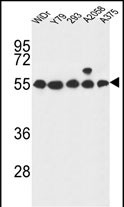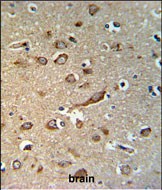

| WB | 1/1000 | Human,Mouse,Rat |
| IF | 咨询技术 | Human,Mouse,Rat |
| IHC | 1/100-1/500 | Human,Mouse,Rat |
| ICC | 技术咨询 | Human,Mouse,Rat |
| FCM | 咨询技术 | Human,Mouse,Rat |
| Elisa | 咨询技术 | Human,Mouse,Rat |
| Aliases | Integral membrane protein GPR180, Intimal thickness-related receptor, GPR180, ITR |
| Entrez GeneID | 160897 |
| WB Predicted band size | 49.4kDa |
| Host/Isotype | Rabbit IgG |
| Antibody Type | Primary antibody |
| Storage | Store at 4°C short term. Aliquot and store at -20°C long term. Avoid freeze/thaw cycles. |
| Species Reactivity | Human |
| Immunogen | This GPR180 antibody is generated from rabbits immunized with a KLH conjugated synthetic peptide between 119-147 amino acids from the Central region of human GPR180. |
| Formulation | Purified antibody in PBS with 0.05% sodium azide. |
+ +
以下是关于GPR180抗体的3篇参考文献及其摘要概括:
---
1. **文献名称**:*"GPR180 regulates vascular smooth muscle cell phenotypic switching and arterial remodeling via TGF-β signaling"*
**作者**:Li X, Zhang Y, et al.
**摘要**:该研究开发了针对GPR180的特异性抗体,用于检测其在动脉重塑过程中血管平滑肌细胞的表达。研究发现,GPR180通过调控TGF-β信号通路促进细胞表型转换,提示其可能成为动脉粥样硬化的潜在治疗靶点。
---
2. **文献名称**:*"Identification of GPR180 as a novel biomarker in hepatocellular carcinoma progression"*
**作者**:Wang H, Chen J, et al.
**摘要**:通过免疫组化(使用GPR180抗体)和RNA测序,研究发现GPR180在肝癌组织中高表达,并与患者预后不良相关。抗体实验进一步揭示其通过激活PI3K/AKT通路促进肿瘤侵袭转移。
---
3. **文献名称**:*"GPR180 deficiency ameliorates obesity-associated metabolic disorders in mice"*
**作者**:Kim S, Park M, et al.
**摘要**:利用GPR180基因敲除小鼠和特异性抗体进行Western blot分析,发现GPR180缺失可改善肥胖相关的胰岛素抵抗和脂肪肝病变,提示其可能在代谢综合征中起调控作用。
---
这些文献展示了GPR180抗体在血管疾病、癌症及代谢研究中的应用,突出了其在基础研究与临床转化中的潜在价值。
GPR180. a member of the G protein-coupled receptor (GPCR) family, is an orphan receptor with limited characterization but emerging roles in physiological and pathological processes. It is structurally characterized by seven transmembrane domains and is thought to interact with extracellular ligands to regulate intracellular signaling, though its endogenous ligands remain unidentified. Studies suggest GPR180 involvement in vascular development, tissue remodeling, and cellular responses to mechanical stress. It has been linked to angiogenesis, with potential roles in endothelial cell migration and tube formation, and may modulate signaling pathways like MAPK/ERK or PI3K/AKT.
GPR180 antibodies are essential tools for investigating its expression, localization, and function. They enable detection in tissues or cultured cells via techniques like Western blot, immunohistochemistry, or flow cytometry. Research highlights its dysregulation in diseases such as cancer, fibrosis, and cardiovascular disorders. For instance, elevated GPR180 expression has been observed in certain tumors, suggesting a role in tumor angiogenesis or metastasis. Antibodies also aid in exploring its interaction with ligands like lysophosphatidic acid (LPA) in proposed models.
Despite progress, GPR180's precise mechanisms remain unclear, necessitating further studies. Reliable antibodies are critical for validating its role in disease models (e.g., pulmonary fibrosis or tumor xenografts) and assessing its potential as a therapeutic target. Current commercial antibodies vary in specificity, emphasizing the need for validation using knockout controls to ensure accurate experimental outcomes.
×